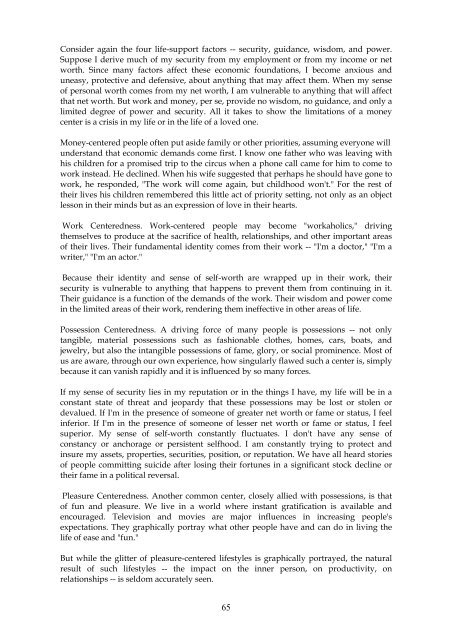Covey - The 7 habits of highly effective people
Create successful ePaper yourself
Turn your PDF publications into a flip-book with our unique Google optimized e-Paper software.
Consider again the four life-support factors -- security, guidance, wisdom, and power.<br />
Suppose I derive much <strong>of</strong> my security from my employment or from my income or net<br />
worth. Since many factors affect these economic foundations, I become anxious and<br />
uneasy, protective and defensive, about anything that may affect them. When my sense<br />
<strong>of</strong> personal worth comes from my net worth, I am vulnerable to anything that will affect<br />
that net worth. But work and money, per se, provide no wisdom, no guidance, and only a<br />
limited degree <strong>of</strong> power and security. All it takes to show the limitations <strong>of</strong> a money<br />
center is a crisis in my life or in the life <strong>of</strong> a loved one.<br />
Money-centered <strong>people</strong> <strong>of</strong>ten put aside family or other priorities, assuming everyone will<br />
understand that economic demands come first. I know one father who was leaving with<br />
his children for a promised trip to the circus when a phone call came for him to come to<br />
work instead. He declined. When his wife suggested that perhaps he should have gone to<br />
work, he responded, "<strong>The</strong> work will come again, but childhood won't." For the rest <strong>of</strong><br />
their lives his children remembered this little act <strong>of</strong> priority setting, not only as an object<br />
lesson in their minds but as an expression <strong>of</strong> love in their hearts.<br />
Work Centeredness. Work-centered <strong>people</strong> may become "workaholics," driving<br />
themselves to produce at the sacrifice <strong>of</strong> health, relationships, and other important areas<br />
<strong>of</strong> their lives. <strong>The</strong>ir fundamental identity comes from their work -- "I'm a doctor," "I'm a<br />
writer," "I'm an actor."<br />
Because their identity and sense <strong>of</strong> self-worth are wrapped up in their work, their<br />
security is vulnerable to anything that happens to prevent them from continuing in it.<br />
<strong>The</strong>ir guidance is a function <strong>of</strong> the demands <strong>of</strong> the work. <strong>The</strong>ir wisdom and power come<br />
in the limited areas <strong>of</strong> their work, rendering them in<strong>effective</strong> in other areas <strong>of</strong> life.<br />
Possession Centeredness. A driving force <strong>of</strong> many <strong>people</strong> is possessions -- not only<br />
tangible, material possessions such as fashionable clothes, homes, cars, boats, and<br />
jewelry, but also the intangible possessions <strong>of</strong> fame, glory, or social prominence. Most <strong>of</strong><br />
us are aware, through our own experience, how singularly flawed such a center is, simply<br />
because it can vanish rapidly and it is influenced by so many forces.<br />
If my sense <strong>of</strong> security lies in my reputation or in the things I have, my life will be in a<br />
constant state <strong>of</strong> threat and jeopardy that these possessions may be lost or stolen or<br />
devalued. If I'm in the presence <strong>of</strong> someone <strong>of</strong> greater net worth or fame or status, I feel<br />
inferior. If I'm in the presence <strong>of</strong> someone <strong>of</strong> lesser net worth or fame or status, I feel<br />
superior. My sense <strong>of</strong> self-worth constantly fluctuates. I don't have any sense <strong>of</strong><br />
constancy or anchorage or persistent selfhood. I am constantly trying to protect and<br />
insure my assets, properties, securities, position, or reputation. We have all heard stories<br />
<strong>of</strong> <strong>people</strong> committing suicide after losing their fortunes in a significant stock decline or<br />
their fame in a political reversal.<br />
Pleasure Centeredness. Another common center, closely allied with possessions, is that<br />
<strong>of</strong> fun and pleasure. We live in a world where instant gratification is available and<br />
encouraged. Television and movies are major influences in increasing <strong>people</strong>'s<br />
expectations. <strong>The</strong>y graphically portray what other <strong>people</strong> have and can do in living the<br />
life <strong>of</strong> ease and "fun."<br />
But while the glitter <strong>of</strong> pleasure-centered lifestyles is graphically portrayed, the natural<br />
result <strong>of</strong> such lifestyles -- the impact on the inner person, on productivity, on<br />
relationships -- is seldom accurately seen.<br />
65


